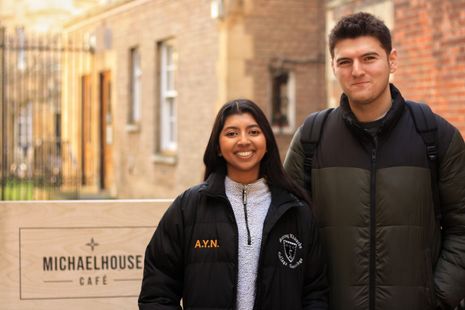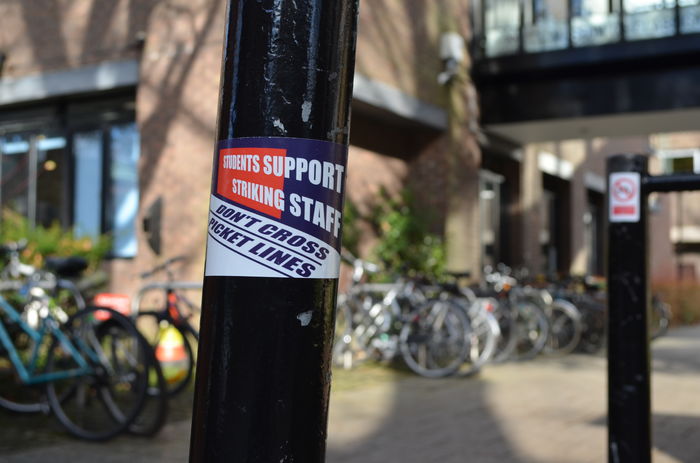Former deals, ongoing strikes, and upcoming elections: speaking to the SU presidents
Editors-in-Chief Emaan Ullah & Bethan Moss speak to Zak Coleman and Anjum Nahar about their time in office

Naturally, the pair of us were running late, but we managed to find a meeting point by Corpus. After a brisk walk down a very sunny King’s Parade, we entered Michaelhouse Café as the SU’s Coffee & Cake drop-in came to an end.
This new drop-in scheme, as it so happens, was one of the first things we asked Zak and Anjum about. There’s always a bit of distance between the average student and their student union president – so has this initiative changed things at all? For both of them, the answer was a resounding ‘yes’. Anjum was glad that they’ve been able “to talk informally with students in a way that we haven’t for ages because of Covid.” Zak added that there were already a number of students regularly involved with the SU, but that the new initiative was a “nice way of capturing other sections of the student population… and hopefully make us seem less remote and more accessible.”
We then delved into what the two of them have been up during their terms to as they enter their final few weeks in office.
“In this role you realise... how many ducks you have to line up in a row to get anything done”
Anjum is most proud of her recent success in scrapping the doctoral application fee and reducing the Master’s application fee. She’s also been busy with the Vice Chancellor advisory committee, which is in place to find Toope’s successor - although she told us that there are “no sexy updates” on that front. Something she’s found more difficult this year, however, has been dealing with issues pertaining to postgraduate funding, especially since “the remit is out of the University’s hands”.
However, she said that the University is asking the right questions on PhD funding, but that “in the UK higher education landscape, we’re still at a point where Master’s students pay so much money. The term ‘cash cows’ comes up a lot - I think Cambridge could be doing more on that front.” She’s also running a consultation for PhD students left without supervisors.
For Zak on the other hand, of the first things he mentioned was the now-scrapped UAE deal, which hit the deadlines in July, and would have been worth £400 million over the next decade. He saw that “as a really egregious affront to what the University should stand for… [and] it was due to a lot of behind the scenes campaigning from us that the University essentially decided to pause, and has now essentially said to us that it’s not going ahead.” Toope revealed to Varsity in an October interview that the deal had been put on hold, but a University spokesperson further refused to rule out the deal entirely to Varsity late November.
“People didn’t feel like [the Women’s Officer by-election” was that important”
Zak was also keen to talk about his work on divestment. He sits on the committee which “approves or rejects controversial funding including from fossil fuel companies,” adding that he’s been pushing “to stop the university [from] greenwashing the reputations of these companies… we simultaneously say it’s unacceptable to invest in Shell and BP, and then in the same breath we accept millions of pounds from their sustainability research.”
“I don’t deny [that these projects are important], but we are the wealthiest university in Europe… if we decided it’s a priority for us to dedicate specific university resources to fundraise specifically for climate-related research we wouldn’t need to put our researchers in [a] really difficult position.”
The conversation then turned to the upcoming SU elections, voting for which will run from 28 February to 3 March. Thirteen positions were up for election, and a list of candidates will be released tomorrow. But in a University of over 24,000, less than 200 students – equivalent to 0.83% – voted in the recent Women’s Officer by-election, following the resignation of Milo Eyre-Morgan in January. Why was turnout so low?
Anjum said: “Everything was really pressed in terms of timeline. This election wasn’t expected by the student body… lots of people didn’t feel like it was that important.” Zak added: “The reality is that student unions across the country have this problem and I think Cambridge has a particular issue partly because of the J and MCR system.”
“We’ve been told again and again by students that they want a break”
However, low turnout is not a one-off occurrence, with only 4,520 students voting in the 2021 SU elections, down from 5,138 in 2020. Zak stressed that he don’t want to be complacent about turnout, and Anjum noted that this will be the first elections since 2020 with in-person campaigning.
Finally, we turned to the SU policy which has garnered the most attention from students: the proposed reading week, or as they’ve rebranded it, the mid-term break. A University review on the matter was circulated earlier this year, and the SU will host a student referendum on the matter in March.
Zak said: “In this role you realise just how many complicated governance structures there are and how many ducks you have to line up in a row to get anything done let alone something as big as changing a term structure that’s been in place for hundreds of years.”
While there appears to be a lot of support for the reading week, it’s not unanimous. When we asked about students that weren’t in favour of the reading week, a number of whom have the concern that more work would be plugged into the break, Zak said: “A lot of the nervousness often comes from what the problem is in the first place, which is a completely understandable concern.” He argued that if a reading week were to be implemented, a “robust system” would be put in place to ensure workloads do not increase, and said the SU could ensure no lectures or seminars will take place in the break.
“We’ve been told again and again by students that they want a break.”
We ended our conversation by talking about the most recent round of UCU strikes, which the SU voted to support last term. Once more, many students have been sympathetic to strikes, but it’s also been met with opposition. Zak said that “after the last two years of education, it’s pretty devastating that there’s going to be additional strikes… [but] we believe that the goals of the strikes will secure the long term future of education”.
He also emphasised that the SU have been doing all that they can to mitigate the effect of industrial action on students, such as a guarantee from the University that mitigations will be put in place for exams.
 Interviews / You don’t need to peak at Cambridge, says Robin Harding31 December 2025
Interviews / You don’t need to peak at Cambridge, says Robin Harding31 December 2025 News / Unions protest handling of redundancies at Epidemiology Unit30 December 2025
News / Unions protest handling of redundancies at Epidemiology Unit30 December 2025 Comment / What happened to men at Cambridge?31 December 2025
Comment / What happened to men at Cambridge?31 December 2025 Features / ‘Treated like we’re incompetent’: ents officers on college micromanagement30 December 2025
Features / ‘Treated like we’re incompetent’: ents officers on college micromanagement30 December 2025 Theatre / We should be filming ADC productions31 December 2025
Theatre / We should be filming ADC productions31 December 2025









